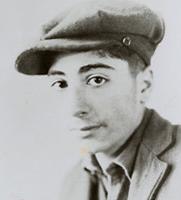William Saroyan
William Saroyan (August 31, 1908 – May 18, 1981) was an influential American author and playwright known for his distinctive narrative style and emphasis on the human condition. Saroyan's works often explore themes of identity, immigration, and the complexities of life in America, particularly through the lens of his Armenian heritage. His storytelling was marked by a blend of optimism, humor, and a deep empathy for the underdog, making his characters and narratives universally relatable.
Early Life[edit | edit source]
William Saroyan was born in Fresno, California, to Armenian immigrants. His early life was marked by poverty and the loss of his father, which deeply influenced his writing and outlook on life. Saroyan's Armenian background played a significant role in his identity, both personally and as a writer, and he often incorporated Armenian characters and themes into his work.
Career[edit | edit source]
Saroyan's literary career began in the 1930s, with his first collection of stories, The Daring Young Man on the Flying Trapeze (1934), quickly establishing him as a unique voice in American literature. His ability to capture the essence of the American spirit during the Great Depression, combined with his lyrical prose and optimistic outlook, resonated with readers and critics alike.
One of Saroyan's most celebrated works is the play The Time of Your Life (1939), which won the Pulitzer Prize for Drama. However, Saroyan famously declined the award, expressing his disdain for the concept of competitive awards in the arts. Despite this, the play remains a landmark in American theater, celebrated for its innovative structure and depth of character.
Saroyan's body of work is extensive, including short stories, novels, plays, and memoirs. His notable works include My Name is Aram (1940), a collection of short stories reflecting his Armenian-American heritage, and The Human Comedy (1943), a novel set in California during World War II, which was adapted into a film and a musical.
Themes and Style[edit | edit source]
Saroyan's writing is characterized by its lyrical prose, humor, and an unwavering faith in the human spirit. His works often explore themes of love, loss, and the search for meaning in an unpredictable world. Saroyan's Armenian heritage and the immigrant experience are recurrent themes, reflecting his own background and the broader American experience.
Legacy[edit | edit source]
William Saroyan's impact on American literature and theater is profound. He is remembered not only for his literary contributions but also for his unique perspective on life and art. Saroyan's work continues to be celebrated for its humanity, warmth, and the timeless themes it explores.
Saroyan's legacy is preserved through various means, including the William Saroyan Foundation and the Saroyan House Museum in Fresno, California, which serves as a testament to his life and work.
Selected Bibliography[edit | edit source]
- The Daring Young Man on the Flying Trapeze (1934)
- The Time of Your Life (1939)
- My Name is Aram (1940)
- The Human Comedy (1943)
See Also[edit | edit source]
Navigation: Wellness - Encyclopedia - Health topics - Disease Index - Drugs - World Directory - Gray's Anatomy - Keto diet - Recipes
Search WikiMD
Ad.Tired of being Overweight? Try W8MD's physician weight loss program.
Semaglutide (Ozempic / Wegovy and Tirzepatide (Mounjaro / Zepbound) available.
Advertise on WikiMD
WikiMD is not a substitute for professional medical advice. See full disclaimer.
Credits:Most images are courtesy of Wikimedia commons, and templates Wikipedia, licensed under CC BY SA or similar.Contributors: Prab R. Tumpati, MD






